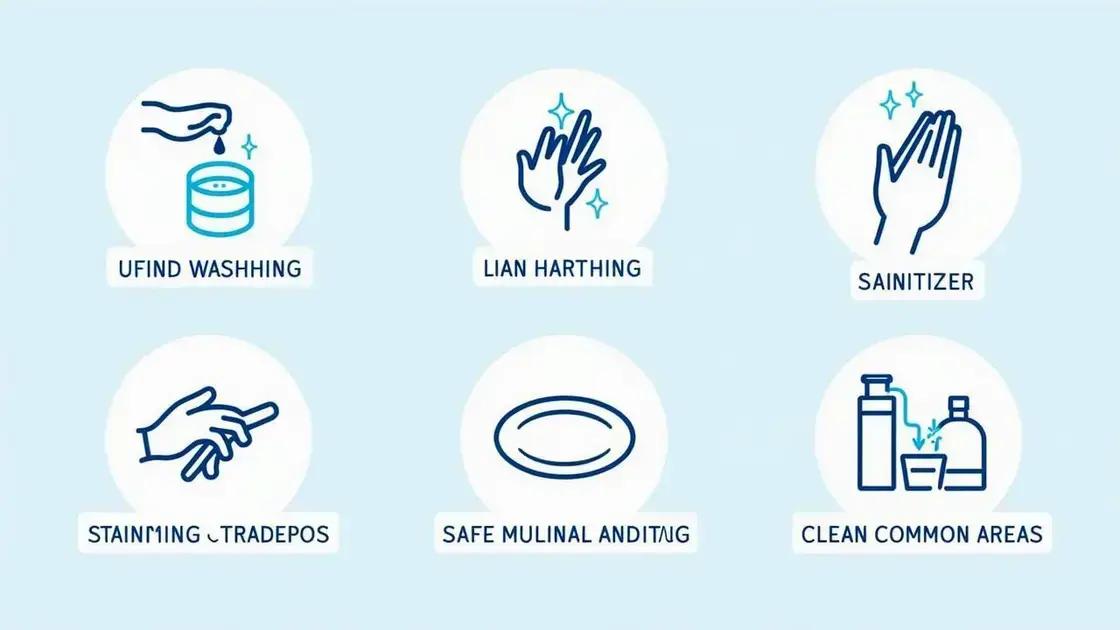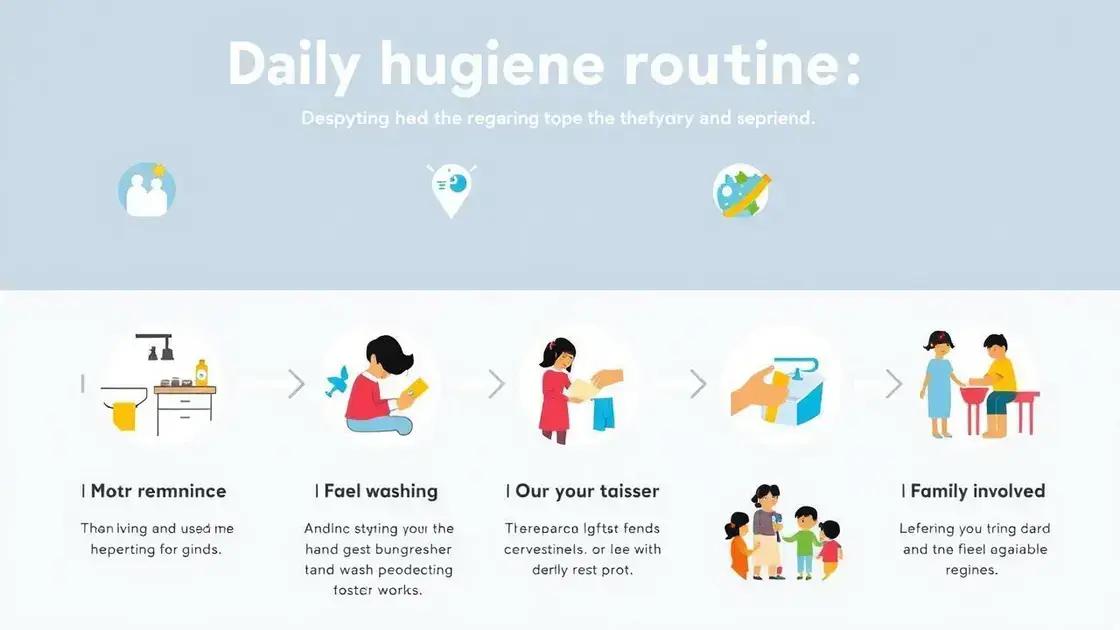To reduce the risk of infections with better hygiene, follow key practices such as regular handwashing, maintaining personal hygiene, and creating a consistent hygiene routine. These strategies not only promote individual health but also help prevent the spread of germs and infections within communities.
In our everyday lives, understanding how to reduce risk of infections with better hygiene is essential for maintaining health and well-being. Whether at home, in schools, or workplaces, implementing effective hygiene practices can significantly lower the chances of infections spreading. This article will explore key factors that contribute to infection risks, emphasize the importance of personal hygiene, and provide practical tips to enhance your hygiene routine.
Understanding Infection Risks

Infection risks are present everywhere, and understanding them is crucial for effective prevention. Infections can occur when harmful pathogens enter the body through various means, such as touching contaminated surfaces or close contact with infected individuals. Recognizing how these pathogens spread helps us adopt better hygiene practices.
Common Ways Infections Spread
Pathogens can spread in multiple ways. One common method is through direct contact with infected individuals. This includes physical interactions like handshaking or hugging. Another significant way is through indirect contact, where germs linger on surfaces like doorknobs, countertops, and shared items.
The Role of Contaminated Surfaces
Surfaces can harbor germs for hours or even days. For example, kitchen counters and bathroom fixtures are often hotspots for bacteria. Regular cleaning and disinfecting these areas is vital for reducing the risk of infection.
High-Risk Environments
Certain places pose higher infection risks, such as crowded public areas, hospitals, and daycare centers. In these locations, the chance of encountering infectious agents increases. Being aware of these environments allows individuals to take extra precautions.
Lastly, understanding personal health factors is essential. Individuals with weakened immune systems may be more susceptible to infections, highlighting the need for consistent hygiene practices. By being proactive about hygiene, you can reduce your risk of infections and promote better health.
Importance of Personal Hygiene

Personal hygiene plays a crucial role in overall health and well-being. Maintaining cleanliness can prevent the spread of infections and diseases. Simple practices like washing hands regularly and maintaining oral hygiene can significantly reduce health risks.
Why Personal Hygiene Matters
Good personal hygiene helps keep harmful bacteria and viruses at bay. For example, handwashing with soap removes germs that can cause illnesses. Regular showering and changing clothes also prevent the buildup of sweat and dirt, which can lead to skin infections.
Effective Practices
To maintain proper hygiene, everyone should establish a routine. This includes brushing teeth at least twice a day, showering daily, and using deodorant. Additionally, trimming nails and keeping them clean can help avoid infections.
Social Implications
Practicing good personal hygiene can also affect social interactions. It helps individuals feel more confident and comfortable in social settings. Poor hygiene, on the other hand, may lead to embarrassment or social rejection, impacting mental health.
In essence, understanding the importance of personal hygiene contributes to healthier lives and environments. Regular hygiene practices create a positive cycle of health, preventing the spread of infections and promoting overall community wellness.
Practical Hygiene Tips

Practicing good hygiene doesn’t have to be complicated. Here are some practical hygiene tips that everyone can follow to reduce the risk of infections:
1. Wash Your Hands Often
Washing hands with soap and water is one of the best ways to remove germs. Make sure to wash for at least 20 seconds, especially after using the bathroom or before eating.
2. Use Hand Sanitizer
If soap and water are not available, use a hand sanitizer with at least 60% alcohol. Apply enough to cover all surfaces of your hands and rub them together until they feel dry.
3. Keep Nail Hygiene
Trim nails regularly and keep them clean. Avoid biting your nails, as this can introduce germs into your mouth. Using a nail brush can help in keeping them clean.
4. Practice Safe Food Handling
Always wash your hands before and after handling food. Use separate cutting boards for raw meat and other foods to prevent cross-contamination.
5. Maintain Oral Hygiene
Brush your teeth at least twice a day and floss daily. Regular dental check-ups are also essential for maintaining oral health and preventing infections.
6. Clean Common Areas
Regularly disinfect frequently touched surfaces like doorknobs, light switches, and cell phones. This helps to minimize the spread of germs in your home or workplace.
7. Stay Home When Sick
If you feel unwell, it’s important to stay at home. This not only helps you recover but also prevents spreading infections to others.
Incorporating these practical tips into your daily routine can greatly enhance your personal hygiene and significantly reduce the risk of infections.
Creating a Hygiene Routine

Creating a hygiene routine is essential for maintaining good health and preventing infections. This routine should be simple, manageable, and fit into your daily life. Here are some steps to help you establish an effective hygiene routine:
1. Start Your Day Right
Begin each morning with a refreshing shower. This not only cleans your body but also wakes you up. Follow up with brushing your teeth to ensure oral hygiene.
2. Handwashing Frequency
Make it a habit to wash your hands regularly. Always wash them after using the bathroom, before meals, and after coming home from public places.
3. Set Reminders
If you sometimes forget to wash your hands or do other hygiene tasks, consider setting reminders on your phone or using sticky notes in visible places to prompt you.
4. Evening Hygiene
In the evening, take time to unwind. Brush your teeth before bed and consider a skincare routine to keep your skin healthy and clean. This practice will help you feel refreshed for the next day.
5. Weekly Maintenance
In addition to daily routines, engage in weekly hygiene practices like trimming nails, cleaning your hair, and washing sheets and towels. These activities ensure a clean and healthy environment.
6. Involve the Family
Encourage family members to develop their hygiene routines. Create a checklist together and have fun tracking personal and family hygiene habits.
By integrating these steps into your daily life, you can effectively create a hygiene routine that supports overall health and minimizes the risk of infections.
In summary, enhancing your hygiene practices is essential for infection prevention
By understanding infection risks and the importance of personal hygiene, you can take meaningful steps toward better health.
Implementing practical hygiene tips and creating a consistent hygiene routine allows individuals and families to maintain cleanliness and reduce the spread of infections effectively.
Remember, even small changes in daily habits can lead to significant improvements in health and well-being.
Prioritizing hygiene is a simple yet powerful way to protect yourself and those around you from illness, contributing to a healthier community overall.
FAQ – Frequently Asked Questions about Reducing Infection Risks
Why is personal hygiene important?
Personal hygiene is crucial for preventing the spread of infections and maintaining overall health. It helps to reduce the chances of illnesses caused by germs.
What are some practical hygiene tips I can follow?
Some practical tips include washing your hands frequently, using hand sanitizer, practicing safe food handling, and maintaining oral hygiene.
How can I create a hygiene routine?
You can create a hygiene routine by incorporating daily habits like showering, brushing your teeth, and washing your hands regularly, along with weekly tasks like cleaning personal items.
What are the signs that my hygiene routine needs improving?
Signs that your hygiene routine needs improvement include feeling frequently unwell, neglecting basic cleaning practices, or feeling self-conscious in social situations.
How often should I wash my hands?
You should wash your hands regularly, especially after using the bathroom, before eating, and after returning home from public places.
Can a hygiene routine help my family stay healthy?
Yes, a consistent hygiene routine promotes health within a family by minimizing the spread of germs and infections among family members.













